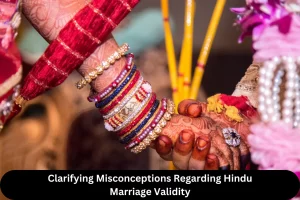ForumIAS announcing GS Foundation Program for UPSC CSE 2025-26 from 27th May. Click Here for more information.

Source-This post on Clarifying Misconceptions Regarding Hindu Marriage Validity has been created based on the article “Clearing the confusion over ‘saptapadi’” published in “The Hindu” on 12 May 2024.
UPSC Syllabus-GS Paper-1-Indian Society- Salient features of Indian Society
Context: This article discusses the misconceptions arising from a recent Supreme Court judgment in the case “Dolly Rani v Manish Kumar Chanchal,”. Misconceptions are particularly related to the requirement of the ‘saptapadi’ ceremony for the validity of Hindu marriages. Clarifying Misconceptions Regarding Hindu Marriage Validity
What is the case and judgement?
The case emerged from a transfer petition in the SC, related to a divorce. In this case petitioners are pushing for divorce with the argument that even though they had been issued marriage certificate, their marriage was invalid because they didn’t perform the traditional ‘saptapadi’.
In its judgement Supreme Court emphasized the importance of Saptapadi ceremony and held that a Hindu marriage cannot be recognized in the absence of a valid ceremony, such as saptapadi.
However, it has created a doubt whether this judgment made the Saptapadi ceremony an essential practice for the validity of the marriage.
| NOTE-Saptapadi is a custom among certain sections of Hindus which involves taking seven steps around the sacred fire. But it is not universally practiced among all denominations. |
What are the issues with this judgement?
1) The judgment didn’t mention other ways to validate the marriage or explore customs with simpler ceremonies like exchanging garlands.
2) SC didn’t state any special status for saptapadi. Therefore, this cannot be understood as the only form of solemnization of marriage.
3) It also didn’t discuss the amendment in Tamil Nadu introducing the suya mariyadhai form of marriage.
What are the requirements of the Hindu Marriage Act regarding solemnization?
1) The Supreme Court stated that as per Section 7 of the Hindu Marriage Act, 1955, a marriage is deemed complete and binding with the performance of customary rites, including ‘saptapadi’ where it is practiced.
Read more- Sapinda Marriage
2) Section 7(2) says that if the rituals include saptapadi, the marriage is complete and legally binding after the seventh step. However, this cannot be understood as the only form of solemnization of marriage.
What was the stand of the previous judgments and amendments in this regard?
In 1967, Tamil Nadu passed an amendment to simplify marriage ceremonies. Upholding this amendment’s validity, the Madras High Court ruled in S. Nagalingam v. Sivagami (2001) that a priest’s presence is not necessary for a valid marriage. Parties can marry in front of relatives or friends, exchanging vows and performing simple rituals like garlanding or exchanging rings.
2) In Balakrishnan v The Inspector of Police (2014) case, the Madras High court held that a marriage conducted in secrecy, called suya mariyadhai, is not valid.
3) In Ilavarasan v The Superintendent of Police and Others (2023), the court disagreed with its earlier ruling in Balakrishnan v The Inspector of Police (2014). It held that a public solemnization or declaration is not required for a valid marriage under Section 7A(1).
The Court argued that imposing a public declaration requirement, not mentioned in Section 7A (1), restricts the law’s broader purpose and violates Article 21 of the Constitution.
Question for practice
What are the requirements of the Hindu Marriage Act regarding solemnization? Highlight the misconception that arose after the Supreme Court’s recent judgement?



